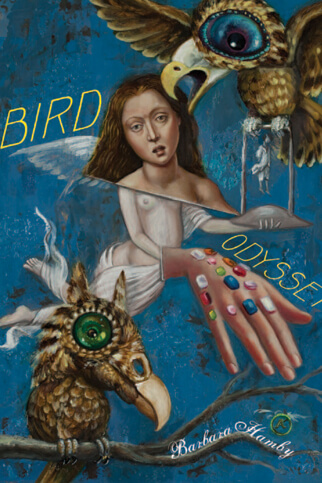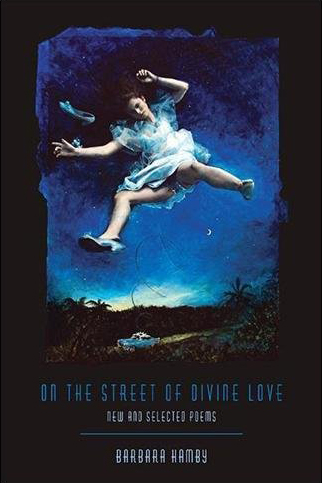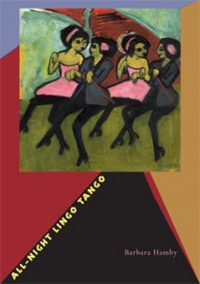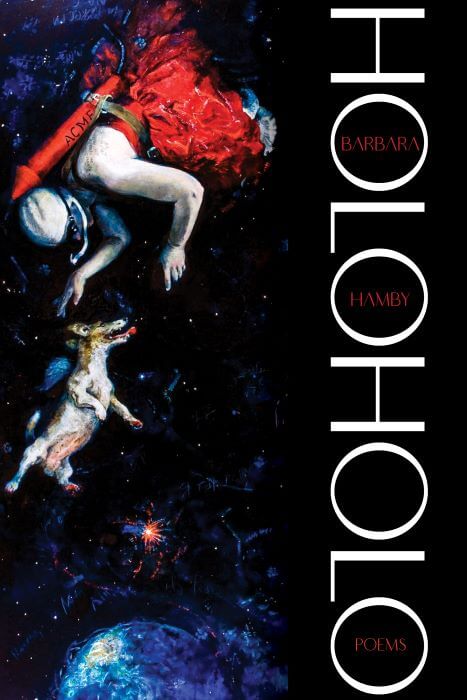BURN (October 2025)
Holoholo (2021)
Holoholo is the Hawaiian word for walking out with no destination in mind. In the three sections of this book Barbara Hamby walks out first into the current American chaos with its fiery inferno of wars, street violence, crazy apocalyptic fantasies, and racial conflagration. Her poems are fueled by the American lingo that embraces slang, Yiddish, street talk, and the yearning to be able to describe her moment in time. Her dead mother appears in a nursing home in Havana, Cuba. She speaks to her younger self and to the sacred heart of everyone. Every foray gives a glimpse of the whole enchilada that she puts together in one woman’s collage of consciousness. All of the poems in this book are odes, poems of praise but also poems that investigate what it means to be a human being and a woman in a world of breathtaking beauty and terror.
Reviews

Bird Odyssey (2018)
Travel has always been Barbara Hamby’s muse, and in Bird Odyssey she hits the road hard, riding a train across Siberia, taking a car trip from Memphis to New Orleans on Highway 61, and following The Odyssey from Troy to Ithaka. The concatenation of images released include Elvis and Tolstoy cruising through the sky in a pink Cadillac, Homer and Robert Johnson discussing their art in the Underworld, and the women in The Odyssey telling their side of the story, because what’s a woman to do in this world of men? She has to strike out on her own, ask the right questions, and tell her own story, translating the world into her own bright lie.
Reviews

On The Street Of Divine Love:
New And Selected Poems (2014)
“Barbara Hamby’s poems are wild, outspoken, seriously funny, motor-mouth rambles that take us through hoops of association to places both unexpected and unimpeachable. This collection offers a generous helping of poems so crackling with references and busy with verbal energy you might feel them buzzing in your hands.”—Billy Collins
“Whether On the Street of Divine Love is the best book of poems in the world will long be debated by literary scholars (some stuffed shirts still put forth The First Folio or a Goldbarth title) but surely it is the world: snazzily beatific, unashamedly carnal, at sumptuous ease with both the down-home blues and the intellectual high life, sometimes porch sitting and sometimes globe-trotting, and always in love with life and with a multiplex language that proves the love, this book is a true-blue spinning planet; maybe there are nine in our system after all!” —Albert Goldbarth
“On the Street of Divine Love bursts with Barbara Hamby’s signature wit and verbal twists. If language were an Olympic sport—and why is it not?—Hamby would bring home the gold in bungee-jumping bobsledding, boogie woogie boxing, and soul-searching curling. Her poems sparkle with their topnotch surfaces, then bring us deep into the gusto of life, the painful and ecstatic truths. Readers will want to linger On the Street of Divine Love.” —Denise Duhamel
Reviews

All-Night Lingo Tango (2009)
This collection is a love letter to language with poems that are drunk and filled with references to the hyperkinetic world of the twenty-first century. Yet Zeus and Hera tangle with Leda on the interstate; Ava Gardner becomes a Hindu princess; and Shiva, the Destroyer, reigns over all. English is the primary god here, with its huge vocabulary and omnivorous gluttony for new words, yet the mystery of the alphabet is behind everything, a funky puppet masterwho can make a new world out of nothing.
Reviews

Babel (2005)
Winner of the AWP Hall Donald Hall Prize
Babel features more of the rhetorical acrobatics that fueled Barbara Hamby’s earlier work. These whirlwinds of words and sounds form vistas, images, and scenes that are at once unique and immediately recognizable.
In poems such as “Six, Sex, Say,” she displays a linguistic bravado that moves effortlessly through translations, cognates, and homonyms. This love of words permeates the poems, from the husband wooing his future wife “with a barrage of words so cunningly fluent, / so linguistically adroit” in “Flesh, Bone, and Red,” to the alphabetic sampler woven from memory and love in “Ode on My Mother’s Handwriting.”
Hamby’s poems drift across histories and continents, from early writing and culture in Mesopotamia through the motion-picture heaven that seems so much like Paris, to odes on such thoroughly American subjects as hardware stores, bubblegum, barbecue, and sharp-tongued cocktail waitresses giving mandatory pre-date quizzes to lawyers and “orangutans in the guise of men.” As Booklist noted in reviewing her previous collection, Hamby’s poems “are tsunamis carrying you far out to sea and then back to shore giddy and glad to be alive.”
Reviews

The Alphabet of Desire (1999)
In this sublime and imposing book of poetry, Barbara Hamby races through the circuitous regions of Heaven and Hell, desire and love, giving shape and significance to the strange and the familiar. Her book ignites with a proclamation, “In the beginning was the word, fanning out into syllables, like a deck of cards on a table in Vegas, lovely leafy parts fluttering into atoms and cells, genus and phylum, nouns and verbs;” an easy metaphor for her intoxicating linguistic machinations.
Hamby’s roaming, inquisitive mind reels in the reader, “I’m persuaded the day will come when I’ll lie static as a falcon in a hunter’s sack, fragments of iron studding my reckless breast.” Not limited to the self-referential, Hamby playfully references historic and literary personae, taking stabs at Shakespeare, Jane Austen, the Bible and Casanova. “Who wouldn’t,” she challenges us, “give anything for the voice of an angel and wings to fly above the rough dirt of birth?”
Reviews

Delirium (1995)
Winner of the 1994 Vassar Miller Prize, The 1995 Kate Tufts Prize, and Poetry Society of America’s 1995 Norma Farber First Book Prize
Barbara Hamby makes her poems out of jokes, Italian phrases, quotes from saints and philosophers, references to meals eaten and wines drunk. In a fluid, compelling voice, she sets a stage, peoples it with real and imagined characters, spins them into dizzying motion, and then makes everything disappear as with a wave of a conjurer’s wand, leaving the reader to wonder, “Did that happen, or did I dream it?” One leaves her poetry the way one leaves a dark theater on a July afternoon, convinced that the ordinary passions really won’t do—they need to be larger, as large as they are in these poems.


